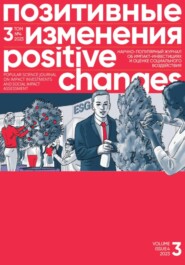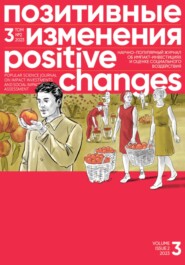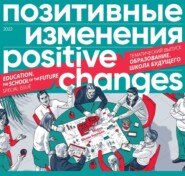По всем вопросам обращайтесь на: info@litportal.ru
(©) 2003-2024.
✖
Позитивные изменения. Том 2, №4 (2022). Positive changes. Volume 2, Issue 4 (2022)
Настройки чтения
Размер шрифта
Высота строк
Поля
It's quite simple. And I understood this even before the concept was introduced in Russia by "Our Future" Foundation. First, that is a person who addresses a social problem. Second, that is a person who must make some minimum profit, so as not to go broke.
The thing that "Our Future" Foundation is working to develop seems very important to me, because they teach the people to make money. You take the money, you have to pay it back. Yes, it is interest-free, but you still have to pay it back. And this is a very good story, because you're really under normal business conditions, perhaps a little more relaxed than for other people, but still, it's not a gift, it's borrowed money.
Positive content, successful cases, long money at 1 % per annum or completely interest-free, – everything you need to develop social entrepreneurs' projects in Russia.
In your opinion, what could make a significant positive change in the social entrepreneurs' projects in Russia – maybe passing a law, building some infrastructure, establishing a development institution, or significantly increasing investment in such projects?
Honestly, I am against any development institutions. All of Moscow is nothing but development institutions, and we, Russia, cannot feed them.
The Observer Factory is worth $3 million or so. 300 billion dollars of Russia's foreign exchange reserves are frozen because of the sanctions. You could say we donated this money to god knows who. We could have built some 100,000 Observers with those 300 billion dollars. When Maxim Reshetnikov, Minister of Economic Development of the Russian Federation, came to us, Kaliningrad Region was allocated 5 billion rubles for small and medium business. This money is lent to businesses at 1 % per annum for seven years. Roughly speaking, if we took those 300 billion of Russia's foreign currency reserves and gave them to the projects of social entrepreneurs at 1 % per annum, they would start working, producing something in-demand, making money, paying taxes, changing the country for better, and do more positive things.
It wouldn't be so much about monetary effect, but rather about social effect. It is hard to calculate, but it is possible.
Even if, say, half of the factories (50,000) went bankrupt, the borrowed money would still return to the treasury in a few years. And Russia, not just Moscow, would receive 50,000 very real small production companies. But in order to do that, the federal government has to trust its people, and vice versa. I'm the crazy guy who trusts his government. Getting something done at the regional and federal levels.
Do you think tax preferences for social entrepreneurs are necessary?
I guess so. But I'm afraid this will immediately become fertile ground for fraud. Just offer long money at 1 % per annum or completely interest-free, and that's it, no need to do anything else.
Generally, I am in favor of people with disabilities paying for admission to the theater, museums, etc. Maybe not full price, but 50 %. Then the museum will know why it has to invest in an accessible environment: because it earns money, and people with disabilities are also its visitors. Let a person with disability earn money. If they don't want to go to work, they can always stay home and watch TV. They wouldn't need any museums.
How can we make sure Russia gets more companies like yours that effectively deal with social problems and contribute significantly to the lives of their communities, regions, countries and the world? And that the world gets these, too?
It seems to me that, first of all, it is important to share successful cases. There are quite a few of them. There's a guy in Kaliningrad, he runs a YouTube channel called "In Process,” and he films industrial enterprises, talks to businessmen and interesting people who are creating something new. He came to us in the summer, shot a video, and got half a million views, 3,000 reactions and comments in three months, of which 2,995 were positive. We've never seen anything like that before. I understand that this kind of content landed with the audience. That is, positive content is highly demanded, amidst the tsunami of negative information about all the current events, from coronavirus to the special military operation. People write to me: "Let's open a rehabilitation center together,” "Let's open a workshop,” "I'm sick of everything, I made some money and I want to do something real,” "Let's do this and that,” "I can weld ramps,” and so on. That is, the video really made a hit. I think this is one of the important points. And the second thing we've already talked about is long money at low interest rates. I guess that's it.
Is it possible to learn to be a social entrepreneur? In my personal opinion, this is impossible. Either you are an entrepreneur or you're not, and it shows right away. It often happens that a person, or their relative or friend, gets into a situation that causes them to go into social entrepreneurship, to address the problem of that friend or relative or whatever. In this case, all we need is to support this man without creating huge federal bureaucratic structures that spend a lot of money on one exemplary exhibition, which will then be shown on television.
What is your personal KPI?
I have one KPI for all lately. The first and foremost is that you look at something and ask yourself: "Is this real or not?” Just like in the case of that exemplary exhibition. Is this real or is it done for three officials only? Are there any final users who will be able to buy the items? If there aren't any, then it's not real and there's no need for more exhibitions.
By the way, did the special military operation have any effect on your relations with your foreign partners?
Very much so. Half of the partners have suspended deliveries. Like the Scandinavians, for example. In fact, only China and Taiwan are still working as before; as for my European partners, only those that I had close personal relationships with do. The EU Consul helped us get an export license for German motors. We sat idle for four or five months with the motors seized, and now with this license we're bringing them in like before. That is, we made it through where we had good personal contacts.
Are you looking for any new partners to replace those who left?
The Danes had a unique transformer ladder, we cannot replace them. No other options exist. We are told: "Oh, just make it yourself.” I understand the "make-it-yourself” thing. When you look at the wheelchair, it seems like a simple thing, but it uses 16 different kinds of pipes. You go to a factory in the Urals, and they sell in batches of at least a thousand meters each. You have 3 million tied up in pipes alone each time. Another 5 million in motors, 6 million in joysticks, 3 million in fabric.
Now I need to make a new model of wheelchair, and I understand this would require some 30–40 million investment; and in the meantime, I have to compete with the Chinese wheelchair suppliers.
You are one of the most famous award-winning social entrepreneurs in Russia. What do you consider your greatest achievement? And what is the real measure of success for you?
My greatest achievement is the team and what we're getting right now. Here they are, really, my people, whom I showed around Europe, telling them: "Get your ideas from here and here.” And then together, standing up to our ankles in the mud, we laid the first capsule with the letter to the descendants in the concrete foundation of the factory. And now you are walking with these people on the second floor of this beautiful office, looking down at the high-tech machines. And you feel great knowing that you made this happen together.
We're all getting a little fed up. We are getting this feeling again – too little, too boring, too slow. But when you see the emotions of other people who visit us, and there are whole double-decker buses arriving with guests, you realize that we, indeed, have done something right and good.
Is money important to you as a measure of success?
Money is important, you see. But it is not important to me per se, it is important as a tool that allows you to be independent and implement some really interesting, beautiful projects, that's all. It's the same thing with fame, with glory. I don't know, I'm very cool about it. First of all, it's a tool to save a little advertising budgets, because if you wanted to run a paid story about yourself on Channel One, that would be insanely expensive. And here it's all free.
And secondly, I want to build better than what we saw in Germany, in Sweden. And we are getting there. I just want to inspire as many people as possible, ignite their hearts and souls, so that the same thing could happen elsewhere.
Two years ago in Kaliningrad Region we disbursed about 20 million rubles in grants. We did it through the Ark, a public organization for people with disabilities. Last year, similar grants were distributed throughout Russia, supporting projects that change the life of wheelchair users for the better. I consider it a big achievement, too.
In terms of performance, who is your example and visionary?
I look at Elon Musk and I don't understand how one man can be so efficient as to revolutionize seven areas. I keep listening to his interviews where he articulates why he does it. And, accordingly, I want to make a real revolution in Russia as well, at least in a few industries. To do something in the social sphere that had never existed in Russia.
I think we will live to see the time when a paralyzed person can have a chip implanted, which transmits neural impulses to places below the injury to restore muscle movement, and I will again be able to do a Latin dance with a woman.
Экспертные мнения / Expert Opinions
Итоги 2022 года импакт-инвестиций: взгляд победителей премии журнала «Позитивные изменения»
7 декабря 2022 года состоялось вручение Первой ежегодной премии научно-популярного журнала об импакт-инвестициях и оценке социального воздействия «Позитивные изменения». Премия присуждается экспертам, авторам журнала и организациям за вклад в развитие оценки социального и экономического воздействия. Кто и за что получил награду, каким победителям премии запомнился 2022 год с точки зрения импакта и развития методологии оценки, какие ключевые события и новые подходы можно выделить – читайте в нашем материале.
Юлия Вяткина
Редактор журнала «Позитивные изменения»
О ПРЕМИИ И НОМИНАНТАХ
Организатором премии выступила «Фабрика позитивных изменений», учредитель журнала «Позитивные изменения», при поддержке партнеров: Ассоциации волонтерских центров, брендингового агентства Wowhouse и фонда развития медиапроектов и социальных программ Gladway. Вручение наград прошло в рамках Международного форума гражданского участия #Мывместе 2022. Победители объявлены в шести номинациях.
«Лучшее время, чтобы посадить дерево, было 20 лет назад. Следующее лучшее время – сегодня», – гласит китайская мудрость. А значит, чтобы реализовать мечту или сделать мир хотя бы чуточку лучше – никогда не поздно. Посаженное дерево обязательно даст урожай.
Как отметила главный редактор журнала «Позитивные изменения» Наталья Гладких, первопроходцы в сфере оценки 20 лет назад посадили саженцы, которые сейчас дают свои плоды: в 2021 году появился научно-популярный журнал «Позитивные изменения», рассказывающий об импакт-инвестициях и оценке социального воздействия.
«Мы решили, что ежегодно будем отмечать тех, кто больше всех восхитил нас с точки зрения импакта. Редакции журнала сложно было выбрать 10 победителей, потому что людей и организаций, которые вдохновляют нас, кто разрабатывает инновационные подходы к оценке, мониторингу и планированию проектной деятельности, очень много. Наши 10 лауреатов – это люди и организации, чей вклад в развитие отрасли оценки и импакта настолько велик, что без них все было бы по-другому», – отметила Наталья Гладких.
БЫТЬ ЯСНЕЕ И БЛИЖЕ К НАРОДУ
В номинации «Развитие института оценки социальных проектов» награду получил Центр перспективных управленческих решений (ЦПУР) за внедрение в систему государственного управления моделей оценки и публикацию методических материалов. В 2020 году ЦПУР и Счетная палата РФ опубликовали экспертную записку «Применение теории изменений для стратегического аудита и стратегического планирования в России»[1 - Ким, А. И., Копыток, В. К., Филиппова, Ю. А., & Цыганков, М. В. (2020). Применение теории изменений для стратегического аудита и стратегического планирования в России. Счетная палата Российской Федерации, Центр перспективных управленческих решений. Режим доступа: https://cpur.ru/teoriya_izmenenij. (дата доступа: 09.12.2022).].
Как отмечают авторы документа, существует разрыв между поставленными стратегическими целями развития России, которые сформулированы Президентом РФ в указах и Правительством РФ в стратегиях, и итоговыми результатами. При формальном достижении показателей не всегда достигается изначально запланированный социально-экономический эффект. Более того, различные группы благополучателей часто не ощущают эффект от поставленных и достигнутых целей. Одним из инструментов преодоления этого разрыва является теория изменений – подход, при котором каждый инструмент государственной политики должен быть сфокусирован на достижении конкретного социально-экономического изменения[2 - Weiss, C. H. (1995). Nothing as practical as good theory: Exploring theory-based evaluation for comprehensive community initiatives for children and families. New approaches to evaluating community initiatives: Concepts, methods, and contexts, 1, 65–92.].
Один из авторов экспертной записки, руководитель проектного направления «Оценка программ и политик» Центра перспективных управленческих решений Максим Цыганков поделился с редакцией журнала «Позитивные изменения», что важного произошло в 2022 году с точки зрения развития оценки в нашей стране.
«Говорить о практике доказательных подходов в госсекторе пока рано, несмотря на то что в 2022 году удалось финализировать ряд проектов по оценке, например, проекты Роструда на микроданных. Так, исследователям стали доступны детальные административные микроданные о состоянии рынка труда. Ожидается, что на этих открытых данных будут основываться исследования, результаты которых помогут улучшить организационные и технологические процессы трудоустройства граждан и подбора кадров для работодателей[3 - Счетная палата Российской Федерации. (2021). Сборник лучших практик и инициатив применения доказательного подхода к принятию управленческих решений. По итогам 1-го Конкурса Счетной палаты Российской Федерации. Москва. Режим доступа: https://ach.gov.ru/upload/iblock/769/a8sk3xrqzdtomz4chspi3r8xkav4wp0f.pdf. (дата доступа: 09.12.2022).]. Кроме того, радует, что в мире растет количество кода и количество репозиториев с прицелом на оценку и анализ данных. Есть и кейсы российских компаний, в том числе МТС. Специалисты Big Data МТС вывели в Open Source первую версию библиотеки Ambrosia для работы с A/B-тестами[4 - Байрамкулов, А. & Хакимов, А. (2022). Ambrosia – Open Source-библиотека для работы с A/B-тестами. Режим доступа: https://habr.com/ru/company/ru_mts/blog/700992/. (дата доступа: 09.12.2022).]. Мы видим, что в основном в доказательствах практик заинтересован бизнес», – рассказал Максим Цыганков.
Из позитивного, по словам эксперта, также можно добавить, что Счетная палата РФ в 2022 году выступила медиатором повестки доказательной политики в госсекторе, продолжив проведение конкурса лучших практик и инициатив применения доказательного подхода к принятию управленческих решений.
Также в номинации «Развитие института оценки социальных проектов» отмечен Центр содействия инновациям в обществе «СОЛь» за внедрение стандарта социальной отчетности и теории изменений в деятельность социальных предприятий.
Стандарт помогает различным социальным проектам и благотворительным организациям сформировать убедительный отчёт об их социальной деятельности, оформить логику преобразующего воздействия проекта. В него включены все данные, требуемые для отчётности, – от организационной структуры до финансов. Также стандарт дает возможность показать реальные результаты своей деятельности инвесторам, государственным органам и другим заинтересованным лицам[5 - ЦСИО «СОЛь». (2014). Стандарт социальной отчётности. Как составлять отчётность на основе результатов своей деятельности. Режим доступа: https://impact.ngo.ru/library/view/31. (дата доступа: 09.12.2022).].
«Мы с душой подходим к тому, чтобы развивать социальные инновации и верим, если есть проблема – есть ее решение. Инструмент по внедрению стандарта социальной отчетности позволяет социальным инноваторам быть яснее и ближе к народу. Хочу добавить, что я очень много времени посвящаю тому, чтобы понять, какие эффекты достигаются социальными предпринимателями, и как помочь государству увидеть социальных предпринимателей. Ту модель оценки социального воздействия, которая разрабатывается сейчас Фондом поддержки социальных проектов, пока очень сложно использовать для сравнения одного игрока с другим, но ее можно использовать для самодиагностики – чтобы увидеть «зону роста» у себя. Оценку может проводить как сам проект, так и независимый игрок», – говорит Алексей Маслов, исполнительный директор центра «СОЛь», директор Департамента акселерационных и образовательных программ Фонда поддержки социальных проектов Агентства стратегических инициатив.














